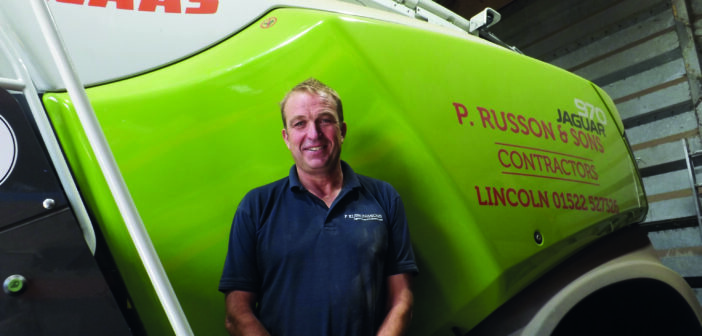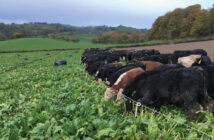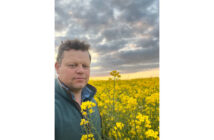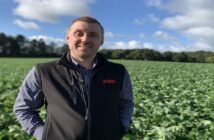Looking to fully utilise equipment, Contractor of the Year Tim Russon has diversified his business to integrate complementary operations.
Success for P Russon & Son, the winner of Contractor of the Year award at the inaugural National Arable and Grassland Awards, has been a result of a willingness to integrate premium, non-agricultural work to extend the utilisation of equipment.
Tim Russon, who started the contracting arm of the business in 1987, is enthusiastic when we speak to him, highlighting his willingness to take on difficult jobs. “You’ve got to have a passion for this industry and be willing to get your hands dirty. You’re only as good as your last job, so if something isn’t done to the highest standard, everything can fall apart.”
Based near Burton, Lincolnshire, Tim says that the onset of maize growing in the area was fortuitous when he started. Having returned to his father’s dairy farm from agricultural college, where the herd numbered 100 cows, he had to bring in additional income so that farm could support all of the family. His father had a Fiat 780 tractor and a four-row Monosem drill, equipment that Tim borrowed and starting using on neighbouring farms.
As the maize acreage grew, he started working alongside another contractor who handled the harvest. In 1990, to handle the increased workload, the Monosem was traded in against a six-row Accord Optima drill. He said: “Between us, we were planting and harvesting around 1,200 acres, which was 1% of the national maize acreage at the time!”
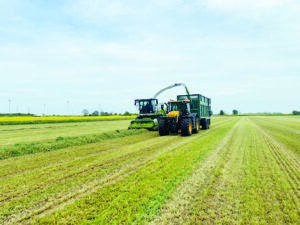
Forage remains the backbone of the company, with four machines running.
The same year, Tim made the decision to purchase his own forage harvester – a Claas 692 SL which he bought for £34,000 from Mill Engineers. Always on top of his costings, Tim calculated that if he harvested 400 acres each of maize and grass, the operation would be profitable. Within the first 12 months, he had chopped 1,000 acres of maize.
Forage continued to be the focus for the next few years, updating the harvester to a Claas 695 Mega in 1991 but Tim was looking for other opportunities. “I wanted niche operations, so that I wouldn’t be stepping on the toes of local contractors but which I could guarantee a certain acreage each year.”
Many of these operations came about from Tim’s desire to offer a full service to customers. He purchased a 3m Moore Unidrill for overseeding grass – a crop he would harvest later in the year. Using the same drill, he found work establishing oilseed rape, which then led to swathing work. At one point, the business was running three swathing units, and while the acreage has dropped significantly in recent years, Tim still runs one machine for between 500 and 600 acres of oilseeds.
Another key operation, which still makes up a proportion of the workload, was making conventional straw bales, which are sold to local showgrounds and event organisers. Tim notes that the company makes some 50,000 bales each year, stacked using a Bale Baron accumulator.
Working with the industry
Tim has been a longstanding member of the National Association of Agricultural Contractors (NAAC). “I joined 30 years ago, and very quickly signed up for the Assured Land-Based Contractor Scheme when that was announced. I appreciate the fact that the NAAC supports contractors and they have been instrumental in helping us be recognised at a policy level.
“I wish the Assured Land-Based Contractor Scheme had a little more clout, but being audited is something that keeps me focused. It helps to put in the groundwork to grow the business and ensure that my staff are safe and working to a high-standard. That’s the aim, that my guys work safely and go home at the end of the day,” Tim said.
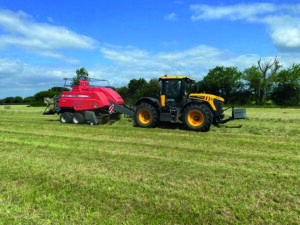
As well as foraging, Tim offers round, large and conventional baling
As the business has grown and diversified, Tim has built staff levels to 10 full-time operators, with up to 20 self-employed and casual operators coming in to help at peak times. The focus on health and safety has been more important as the business has moved into operations on the periphery of agriculture.
“For a long time, we were employed to process plastic waste on a dock,” he said. “This meant that we had to have all the health and safety certification, and prove that we could work to those standards. As more farms have moved into anaerobic digestion, making up a good proportion of our foraging work, this has been vital here.”
Looking at different applications for the equipment has led to exponential growth for P Russon & Son. Tim now runs four self-propelled forage harvesters, all provided by Claas, with two 970 machines, an 870 and an 850. Three of the machines are used for maize, grass and wholecrop, while the 850 has been modified to harvest miscanthus, which has resulted in extended interest in the business: from the Lincolnshire area to nearly nationwide. Farmers growing miscanthus from as far away as Suffolk hire Tim to handle the perennial energy crop.
“It wasn’t easy to start off with. Miscanthus still isn’t recognised as a crop by the manufacturers, so with the help of our dealer we had to make adjustments to the 850 machine, including replacing the drum with a specially designed one as well as taking the drum bottom out and blanking off the shoot,” he said. “It was trial and error but the benefits have been massive. It means that we’re running the foragers nearly all year round, which, considering the cost of equipment, is vital nowadays.”
Costing the equipment is important because the business keeps a high level of machinery on site. There are 15 tractors, split between New Holland and JCB Fastracs, a comprehensive fleet of trailers to handle all the various haulage tasks. Claas supplies most of the grassland equipment, apart from balers, which come from McHale and Massey Ferguson. Claas also supplies the 670 Lexion combine harvester, which handles cereals and grain maize.
That’s just a proportion of the kit on site, in addition to a range of arable equipment. Where possible, Tim invests in guidance equipment to maximise efficiency, and uses telematics to keep variable costs in check.
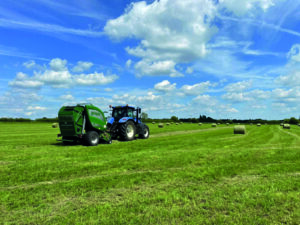
Horsepower comes from New Holland and JCB, with Tim trying to buy British where possible.
“The fuel is the biggest thing that is impacting our operations day-to-day,” he said. “So being able to keep track of that means that I don’t have any nasty surprises at the end of the month. I also opt for extended warranties where I can to fix those costs and maximise the uptime. We’re so diversified that it can be hugely detrimental to have a single machine go down for any extended length of time.”
Tim added that the last few hours on a machine are the cheapest, so he tries to run machines to high hours where possible. Once they are out of warranty, the business takes on servicing duties – with some machines passing the 10-year mark.
The right opportunities
Tim noted that the business is working close to capacity at the moment, although he’s always interested in the right opportunity. “One of the big issues is finding quality, reliable staff,” he said. “I’ve got a good team around me, but new enterprises would require more people and good labour is always difficult to find.”
Perhaps more than taking on additional work, Tim is keen to work with organisations and other contractors to benchmark his own performance and improve the operations being done. “It’s the reason that the NAAC and the Assured Land-Based Contractors Scheme are so important to me,” he concluded. “It not only provides support for my business, but puts me in touch with other operators who I can compare notes with and learn from. There’s a lot of interesting things happening in our industry and we can all learn from each other.”
More information
Read about the 2023 NAGA winners, including this year’s Farm Manager of the Year Award winner here.
For news and updates about the NAGA awards, nominees and winners, follow
National Arable and Grassland Awards
#NAGAwards

